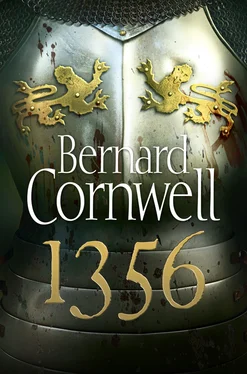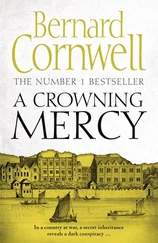‘And the second quarrel?’
The abbot had paused. ‘Villon took the Count of Labrouillade’s wife,’ he finally admitted.
‘Ah.’ Brother Michael had not known what else to say.
‘Men are quarrelsome,’ the abbot had said, ‘but women always make them worse. Look at Troy! All those men killed for one pretty face!’ He looked sternly at the young English monk. ‘Women brought sin into this world, brother, and they have never ceased to bring it. Be grateful that you are a monk and sworn to celibacy.’
‘Thanks be to God,’ Brother Michael had said, though without much conviction.
Now the town of Villon was filled with burning houses and dead people, all because of a woman, her lover, and a cartload of hides. Brother Michael approached the town along the valley road, crossed a stone bridge and so came to Villon’s western entrance, where he paused because the gates had been torn from the arch’s stonework by a force so massive that he could not imagine what might do such a thing. The hinges were forged from iron, and each had been attached to its gate by brackets longer than a bishop’s crozier, broader than a man’s hand and thick as a thumb, yet the two leaves of the gate now hung askew, their scorched timbers shattered and their massive hinges wrenched into grotesque curls. It was as though the devil himself had plunged his monstrous fist through the arch to rip a path into the city. Brother Michael made the sign of the cross.
He edged past the fire-blackened gate and stopped again because, just beyond the arch, a house was burning and in the door opposite was the body of a young woman, face down, quite naked, her pale skin laced with rivulets of blood that appeared black in the firelight. The monk gazed at her, frowning slightly, wondering why the shape of a woman’s back was so arousing, and then he was ashamed that he had thought such a thing. He crossed himself again. The devil, he thought, was everywhere this night, but especially here in this burning city beneath the fire-touched clouds of hell.
Two men, one in a ragged mail coat and the other in a loose leather jerkin and both holding long knives, stepped over the dead woman. They were alarmed by the sight of the monk and turned fast, eyes wide, ready to strike, but then recognised the grubby white robe and saw the wooden cross about Brother Michael’s neck and ran off in search of richer victims. A third soldier vomited into the gutter. A rafter collapsed in the burning house, venting a blast of hot air and whirling sparks.
Brother Michael climbed the street, keeping his distance from the corpses, then saw a man sitting by a rain barrel where he was trying to staunch the bleeding from a wound in his belly. The young monk had been an assistant in his monastery’s infirmary, and so he approached the wounded soldier. ‘I can bind that up,’ he said, kneeling, but the wounded man snarled at him and lashed out with a knife, which Brother Michael only avoided by toppling sideways. He scrambled to his feet and backed away.
‘Take off your robe,’ the wounded man said, trying to follow the monk, but Brother Michael ran uphill. The man collapsed again, spitting curses.‘Come back,’ he shouted, ‘come back!’ Over his leather jerkin he wore a jupon that showed a golden merlin against a red field and Brother Michael, dazedly trying to make sense of the chaos about him, realised that the golden bird was the symbol of the town’s defenders, and that the wounded man had wanted to escape by stealing his monk’s robe and using it as a disguise, but instead the man was trapped by two soldiers in green and white colours who cut his throat.
Some men wore a badge showing a yellow bishop’s staff surrounded by four black cross-crosslets, and Brother Michael decided they had to be the bishop’s soldiers, while the troops who wore the green horse on the white field must serve the Count of Labrouillade. Most of the dead displayed the golden merlin, and the monk noted how many of those corpses were spitted by long English arrows that had blood-speckled white feathers. The fighting had passed through this part of the town, leaving it burning. Fire leaped from thatched roof to thatched roof, while in the places where the fire had not reached a horde of drunken, undisciplined soldiers plundered and raped amidst the smoke. A baby cried, a woman shrieked, then a blinded man, his eyes nothing but blood-weeping pits, staggered from an alley to collide with the monk. The man shrank away, whimpering, holding up his hands to ward off the expected blow.
‘I won’t hurt you,’ Brother Michael said in French, a language he had learned as a novice so he would be fitted to finish his education at Montpellier, but the blinded man ignored him and stumbled down the street. Somewhere, incongruous in the blood and smoke and shouting, a choir sang, and the monk wondered if he was dreaming, yet the voices were real, as real as the screaming women and sobbing children and barking dogs.
He went cautiously now, for the alleys were dark and the soldiers wild. He passed a tanner’s shop where a fire burned and he saw a man had been drowned in a vat of the urine used to cure the hides. He came into a small square, decorated with a stone cross, and there he was attacked from behind by a bearded brute wearing the bishop’s livery. The monk was pushed to the ground and the man bent to cut away the pouch hanging from his rope belt. ‘Get away! Get away!’ Brother Michael, panicking, forgot where he was and shouted in English. The man grinned and moved the knife to threaten the monk’s eyes, then he opened his own eyes wide, looked horrified and the flame-lit night went dark with a spray of blood as the man slowly toppled over. Brother Michael was spattered with the blood and saw that his assailant had an arrow through his neck. The man was choking, clawing at the arrow, then began to shudder as blood pulsed from his open mouth.
‘You’re English, brother?’ an English voice asked, and Michael looked up to see a man wearing a black livery on which a white badge was slashed with the diagonal bar of bastardy. ‘You’re English?’ the man asked again.
‘I’m English,’ Brother Michael managed to speak.
‘You should have clouted him,’ the man said, picking up Brother Michael’s staff, then hauling the monk to his feet. ‘Clouted him hard and he’d have toppled over. Bastards are all drunk.’
‘I’m English,’ Brother Michael said again. He was shaking. The fresh blood felt warm on his skin. He shivered.
‘And you’re a long bloody way from home, brother,’ the man said. He had a great war bow strung across his muscled shoulders. He stooped to the monk’s assailant, drew a knife and cut the arrow out of the man’s throat, killing him in the process. ‘Arrows are hard to come by,’ he explained, ‘so we try to rescue them. If you see any, pick them up.’
Michael brushed down his white robe, then looked at the brutal badge on his rescuer’s jupon. It showed a strange animal holding a cup in its claws. ‘You serve …’ he began.
‘The Bastard,’ the man interrupted. ‘We’re the Hellequin, brother.’
‘The Hellequin?’
‘The devil’s souls,’ the man said with a grin, ‘and what the hell are you doing here?’
‘I’ve a message for your master, le Bâtard .’
‘Then let’s find him. My name’s Sam.’
The name suited the archer, who had a boyish, cheerful face and a quick grin. He led the monk past a church that he and two other Hellequin had been guarding because it was a refuge for some of the townsfolk. ‘The Bastard doesn’t approve of rape,’ he explained.
‘Nor should he,’ Michael responded dutifully.
‘He might as well disapprove of rain,’ Sam said cheerfully, leading the way into a larger square where a half-dozen horsemen waited with drawn swords. They were in mail and helmets, and all wore the bishop’s livery, and behind them was the choir, a score of boys chanting a psalm. ‘ Domine eduxisti ,’ they sang, ‘ de inferno animam meam vivificasti me ne descenderem in lacum .’
Читать дальше












